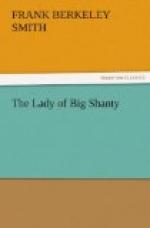The silent apparition stood in a pair of soaked moccasins. On his legs were worn trousers of deerskin, patched here and there with the skins of muskrats and squirrels; one thin brown knee showed bare through a rent. Over a tattered woollen shirt hung an old cloth coat twice too big for him—moss-green from exposure, the sleeves of which hung in shreds over his bony fingers. Framed by a shock of sandy hair falling to his shoulders, and by an unkempt, tow-coloured beard, his eyes shone out in the firelight over his cheek-bones, with the cavernous brilliancy of an owl’s. To have guessed his age would have been impossible. The truth was he was thirty-one.
No one spoke. They watched.
The trapper rose to his feet and laid his hand on the stranger’s shoulder. The figure, with a wistful look in his eyes, twisted his emaciated body and held out his hand. The trapper grasped the thin, sinewy fingers in both his own.
“Friend,” he said, turning to Thayor, “I’d like to make ye acquainted with my son—Bob Dinsmore.”
CHAPTER TWENTY-ONE
The sudden apparition of this pitiful outcast, worn by exposure and untold suffering—coming as he did into the midst of the little band of refugees struggling with their own misfortunes, and the confidence of the trapper in those he was leading to safety, had brought a sudden joy to the old man’s heart. He vowed inwardly now that his son should wander no longer—he would save him with the rest.
It had not been the first time the trapper had acknowledged the hide-out as his son. A week after Bailey was shot he had told Holcomb and Freme—with them he knew his son’s secret was safe; they, too, had helped the outcast more than once.
Years ago this strange old man had come out of the forest into the valley below Big Shanty, settled there and, after some years, married. No one knew where he came from, neither did they know he had been married before. As to his son’s name, “Bob Dinsmore,” it could hardly be called assumed, for he had never been known by any other. When a boy of sixteen he had, like his father, appeared in the valley, hailing, like so many others in that remote region, from nowhere in particular. He gave out that he had worked for a man on Black River—that was sufficient. The two built a cabin and the old man and the boy became boon companions. There was nothing strange in this. When Bob Dinsmore became twenty-two years of age he married—later he killed Bailey. That was the whole story.
After that the old man had become a hermit from choice, helping his son when he could—often at the risk of his own life. Finally this became impossible and he was obliged for a time to let him save himself.




